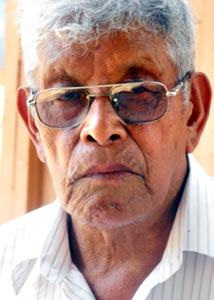Name: Sither
(Alias: No)
Gender: Male
Interview Age: 74
Date of Birth: 1936
Birthplace: Nelung, Utsang, Tibet
Year Left Tibet: 1960
Profession: Servant
Monk/Nun: No
Political Prisoner: No

Interview No.: 61M
Date: 2010-04-07
Language: Tibetan
Location: Doeguling Settlement, Mundgod, Karnataka, India
Categories: Culture and History
Keywords: childhood memories, Chinese -- oppression under, Chinese army -- invasion by , Chushi Gangdrug guerrillas, education, forced labor, nomadic life, poor/lower class, servitude, taxes, thamzing/struggle sessions, Utsang
Summary:
Sither belonged to a humble family and his father passed away when he was 10 years old. His family was kyangkyang meaning they did not own land and cared for goats and sheep belonging to a wealthy family. He recounts in detail how the system worked, the wages they received in the form of provisions and animals. They owned a small number of animals from which to get milk and wool; their animals grazed in the grasslands of the wealthy family.
Sither talks about his life as a servant of the Dagthon family, his duties and wages, how he was treated and the kind of relation he shared with his master and the two sons. He was privileged to attend school for a while with the Dagthon's two sons. Sither recalls the Reformation Committee initiated by His Holiness the Dalai Lama to bring about changes in the tax system.
Sither's master Dagthon Chogyal Dorjee was the District Administrator of Kyerong and Sither helped with the trade in salt, rice and grains. Once the Chinese arrived Sither's master was arrested and as a form of tax, Sither was selected along with many other villagers to construct roads for the Chinese. The workers lived in large tents and were paid wages based on the length of road constructed. He witnessed thamzing 'struggle sessions' perpetrated on two men at the road construction site.
Interview Team:
- Rebecca Novick (Interviewer)
- Ronny Novick (Videographer)
- Namgyal Tsering (Interpreter)

